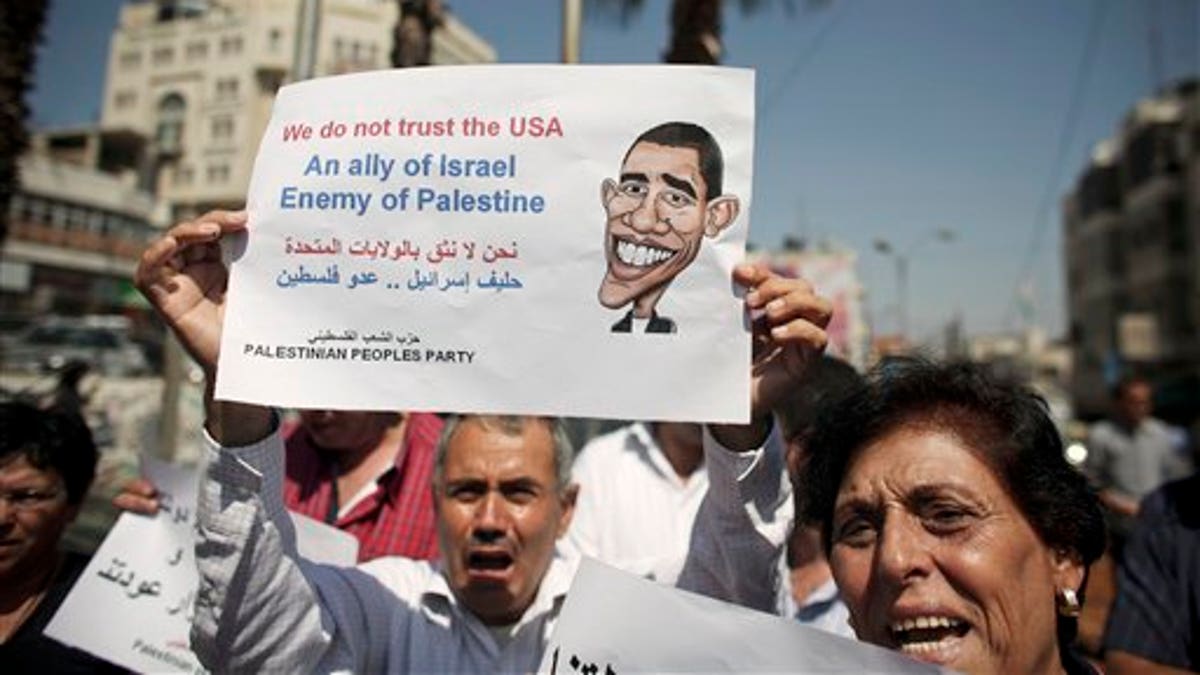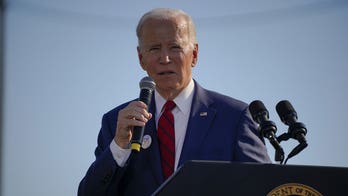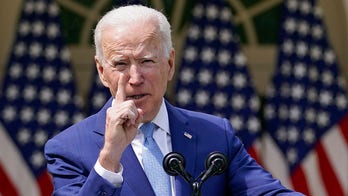
September 7: A Palestinian man holds a sign protesting U.S. involvement in the Middle East, in the West Bank city of Ramallah, Wednesday. (AP)
WASHINGTON -- The Obama administration is making a final effort to avert a diplomatic crisis over a Palestinian drive to win U.N. recognition as an independent state that threatens to provoke a regional meltdown and further isolate Israel, the top U.S. ally in the Mideast.
The administration's top two Mideast envoys were leaving Tuesday for Israel and the Palestinian territories to try to persuade the Palestinians to drop their U.N. plans and bring both sides back to long-stalled talks. At the same time, Deputy Secretary of State William Burns was visiting Saudi Arabia and the United Arab Emirates this week in part to seek Arab support for a still-undefined plan that could defuse the situation.
Secretary of State Hillary Rodham Clinton said she was sending David Hale, the special envoy for Middle East peace, and Dennis Ross, the top Mideast adviser at the National Security Council, to try "to create a sustainable platform for negotiations that can produce the two-state outcome that we seek."
"Our hope is we get the parties back into a frame of mind and into a process where they actually begin negotiating again," Clinton told reporters at the State Department.
Hale and Ross was to meet with Israeli Prime Minister Benjamin Netanyahu and Palestinian President Mahmoud Abbas on Wednesday and Thursday before returning to the U.S. ahead of the annual U.N. General Assembly session that begins Sept. 20 in New York.
- Palestinian Leader Will Ask for Full U.N. Membership
- Abbas Paints U.S. Into a Corner With Palestinian Statehood Demand at U.N.
- The Time Is Now for a Three-State Solution to End the Israeli-Palestinian Conflict
- Congresswoman Seeks to Derail U.N. Vote on Palestinian Statehood by Withholding Aid
- Diplomatic Flurry Ahead of Palestinian UN Bid
- Jordan Prefers Talks for Palestinian State
The two were in the region just last week but failed to persuade Palestinian officials to abandon their quest for U.N. recognition. Palestinian officials say they will bring their resolution to the U.N. sometime during the General Assembly and use their desired recognition to gain leverage with Israel.
Israel is vehemently opposed to such a move and the United States has said it will veto it in the U.N. Security Council. However, the Palestinians have suggested that instead of going to the Security Council, they may seek a vote on recognition in the General Assembly, where the U.S. cannot veto it and it is likely to pass.
Israel and the United States insist that the United Nations is not the forum to create a state and that a future Palestine must come as the result of direct negotiations.
"We need an environment that is conducive to direct negotiations," Clinton said of the goal of the Hale-Ross mission. "We all know that no matter what happens or doesn't happen at the U.N., the next day is not going to result in the kind of changes that the United States wishes to see that would move us toward a two-state solution that we strongly support. The only way of getting a lasting solution is through direct negotiations between the parties and the route to that lies in Jerusalem and Ramallah, not in New York."
She said the issue "is not simply that action in New York will not bring peace and stability, but it will create more distractions toward achieving that goal."
To persuade the Palestinians not to go to the U.N., the U.S. has been trying to get its partners in the international diplomatic "Quartet" of Middle East peacemakers -- the United Nations, European Union and Russia -- to adopt a statement calling for a return to direct talks under a loose framework laid out by President Barack Obama in May. That effort has yet to be successful and took a hit on Monday when Russia said it would vote for whatever resolution the Palestinians present at the U.N.
Under a rough timeline being proposed by the Americans, Hale and Ross would win an agreement in principle from the Israelis and Palestinians to resume negotiations that broke down nearly one year ago. That would then be followed by a statement of support from the Quartet, which would also propose parameters for the talks.
To try to forge a consensus within the Quartet, Clinton spoke on Monday to EU foreign policy chief Catherine Ashton and on Tuesday with former British Prime Minister Tony Blair, the Quartet's special representative.
The Palestinian bid for recognition comes at a particularly delicate time in the Middle East, especially as it relates to Israel and its neighbors. Once-strong ties between Israel and Turkey have frayed in recent weeks over Israel's refusal to apologize for its deadly raid on a Gaza-bound aid flotilla last year that killed nine Turks. And, the Jewish state's ties with Egypt have been tested by the weekend attack on the Israeli Embassy in Cairo.
The U.S., which regards all three countries are crucial allies, has moved to try to ease tensions but both Turkey and Egypt are expected to support Palestinian moves at the U.N, which will further strain ties.




